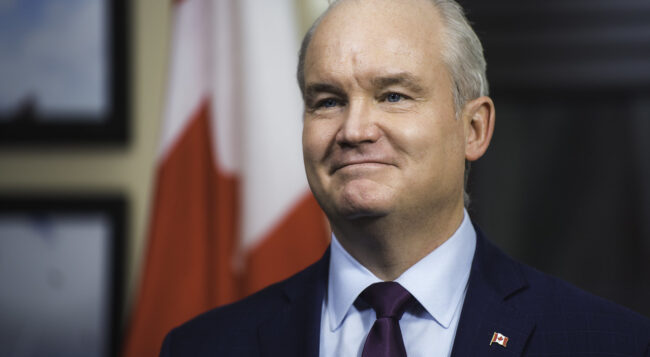By Andrew Enns and Michael Bernstein. Originally published by The Hill Times.
Back in April, Conservative Leader Erin O’Toole made a bold decision to include a price on carbon in his climate platform.
This marked a big departure from the approach taken by his predecessor, Andrew Scheer, who made opposition to carbon pricing a signature part of his election campaign. O’Toole chose to go the other way, announcing a carbon charge that would flow into individual low-carbon savings accounts.
Since the election and the party’s disappointing result, some Conservative insiders have argued that O’Toole’s embrace of carbon pricing was a mistake that cost the party votes. But a new exit poll by Leger and Clean Prosperity shows that’s not true.
The poll of 2,300 Canadians, conducted between Sept. 21 to 23, was especially interesting in what it told us about potential Conservative voters—people who were open to voting Conservative but in the end, chose another party. Attracting these voters is critical if Conservatives want to win the next election.
Did carbon pricing scare these people away? Our data suggests it didn’t. Just eight per cent of potential Conservative voters said that O’Toole’s carbon pricing policy made them less likely to vote for the Tories. In contrast, 21 per cent said carbon pricing made them more likely to support O’Toole. (One in four who did vote Conservative said the same thing.)
What about the theory that O’Toole’s climate package drove potential Conservative voters to the People’s Party of Canada? We find no evidence for this. Not a single one of the People’s Party voters in our poll mentioned climate change or opposition to carbon taxes when we asked them the main reason they voted PPC.
It’s true that O’Toole didn’t increase the Conservatives’ vote share from the 2019 campaign, nor did he make meaningful gains in key suburban ridings like Ontario’s 905 or B.C.’s Lower Mainland. But to suggest that his shift in position on carbon pricing is to blame is an error. On the contrary, it’s likely he would have fared worse without a price on carbon.
Here’s why. A party that is serious about governing Canada has to have a credible climate change strategy. In our poll, 58 per cent of Canadians said they wouldn’t even consider voting for a party that doesn’t have a serious climate plan. Without clearly demonstrating that he was serious about climate change, O’Toole would have been fighting the election campaign with one hand tied behind his back.
That’s where carbon pricing comes in. If you’re trying to convince voters—not to mention experts who influence public perception—that you have a credible plan, taking carbon pricing off the table would be sending exactly the wrong message. Canadians now largely accept that pricing carbon pollution makes sense, and they use a price on carbon as a cue that tells them a climate strategy is serious. That’s especially true for potential Conservative voters, 68 per cent of whom told us that carbon pricing should be a priority in a credible climate plan.
Rather than asking if they went too far on climate, Conservatives should consider whether they didn’t go far enough. More than half of potential Conservative voters believe the party should do more on climate, versus just five per cent who said it should do less.
The poll also found that while voters approved of O’Toole’s decision to adopt carbon pricing, they weren’t crazy about his low-carbon savings accounts. People much preferred more conventional forms of carbon pricing that return money through rebates or tax cuts.
As the Tories do a post-mortem on the campaign they need to focus on the aspects that truly hampered their electoral efforts. The party’s climate change policy with its price on carbon was not the issue some may make it out to be.
The bottom line is that a retreat on climate change that abandoned carbon pricing would hurt the Conservative Party a lot more than it would help them.







